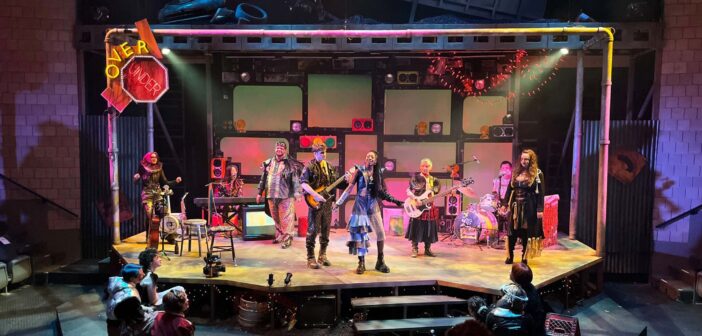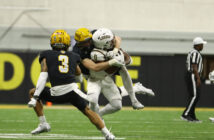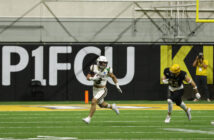As he stepped onto Diamond Theatre’s stage and took a seat on a single, spotlight-illuminated stool, Matt Lindley’s fingertips were calloused from hours of holding down guitar strings. His nails were a few weeks grown out, allowing him to better maneuver his hand as a pick.
For the last few weeks, Lindley, ‘26, has been spending at least six hours per day preparing to be the lead of the new musical, a role that required him to be on stage for an hour and a half, playing both electric and acoustic guitars along with the banjo.
The Department of Theatre’s recent production of “Rags Parkland Sings the Songs of the Future” opened on Nov. 10, bringing almost 100 people to the Diamond Theater in Zoellner Arts Center.
This science fiction rock musical, set in the year 2251, tells the story of Rags Parkland, a human musician played by Lindley, who has returned to Earth from the moon and is recounting memories of performing an illegal concert with his cyborg friends who have been killed by the government.
“The story that I’m trying to tell and that we’re trying to get at isn’t actually about the moon and robots and all of these ridiculous things,” Lindley said. “It’s a story about hope and activism.”
Lyam Gabel, a professor of theatre and the show’s director, said the use of cyborg characters — though they do not directly parallel any specific real-life oppressed group — creates larger metaphors about systems of oppression and histories of colonization.
“Something that I think is really important is that it’s enabled us to have conversations about systems of oppression without anyone in the room needing to rearticulate their trauma for the rest of the group,” Gabel said.
Lindley said the audience becomes a part of Rags Parkland’s concert by him talking directly with the audience and referring to them as members of the Eastern Republic, where the show is fictionally set.
Lindley informs the audience, whether they are human or part-robot, since they are attending this illegal concert, they are also able to be prosecuted by their oppressive government.
Four songs into the show, the kabuki screen behind Lindley drops, revealing his band, The Future. A live feed of the performers is projected on 13 media screens as they sing and dance on stage.
“One of the biggest strengths of this show isn’t even the actors and musicians,” Lindley said. “It’s the lights and what happens on stage.”
Theatre professor Erica Hoelscher said she had previously read the musical but the visuals on stage made her understand the musical differently.
She attended the opening of the show to support her student mentee, Ophelia Thompson, ’24, who was the costume designer for the production. The costumes, she said, were her favorite part of the show.
Hoelscher said the costume design incorporated a style called Afrofuturism.
“It had a kind of space age, futuristic design that was very suitable to the overall context and to the characters,” Hoelscher said. “(Thompson) mixed in a lot of metallics and shiny surfaces and lots of trim and asymmetry involving the head, makeup and hair.”
Gabel said this is the third show he has directed at Lehigh but his first musical. They said when they listened to the album, they fell in love with the music and chose the musical because the songs were fun and the holistic production is large and complex.
Lindley said his understanding of the text and his character evolved throughout rehearsals of the show.
In one of the first songs of the show, “Stella Charlemagne,” Lindley sings about a woman having a phobia of rain.
Originally, he said he didn’t understand the double meaning behind the lyrics until he started looking for the “little things” that clued him into realizing Charlemagne’s phobia stemmed from her unknowingly being a robot.
Lindley said his commitment to his character came from believing in the message behind the show and in Gabel’s abilities as a director.
“I want to lose myself in the character, to forget that I’m me, because that’s when you perform successfully,” Lindley said.
Associate director Juliana Kilgore, ‘24, said in addition to the complexity of the storyline, the physicality of the show was a large undertaking for performers as many of them had to play instruments while simultaneously singing and reciting lines.
The cast members played guitars, bass, banjo, keyboard, drums and saxophone.
“Some of them are playing an instrument which is really cool but adds a little pressure and nerves because you have to do both at the same time,” Kilgore said.
Lindley said he had only been playing guitar for about a year before the opening night of the show on Nov. 10 but his confidence greatly increased with practice.
He said he had to balance learning guitar on top of rehearsals, his participation in his fraternity and an 18-credit course load as an IDEAS major.
Regardless of major or career aspirations, Lindley said theater is something he encourages students to get involved in because, as his old singing teacher used to tell him, the arts “keep your spirit alive.”
“At a college level, theater can be magical because it’s so pure and honest,” Lindley said. “I’ve gone from here to here in how much better of a performer I am because of this experience and I’m really grateful for it.”






Comment policy
Comments posted to The Brown and White website are reviewed by a moderator before being approved. Incendiary speech or harassing language, including comments targeted at individuals, may be deemed unacceptable and not published. Spam and other soliciting will also be declined.
The Brown and White also reserves the right to not publish entirely anonymous comments.